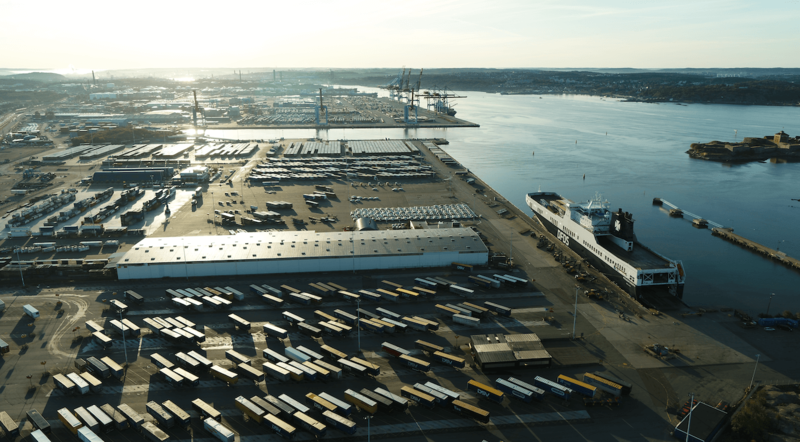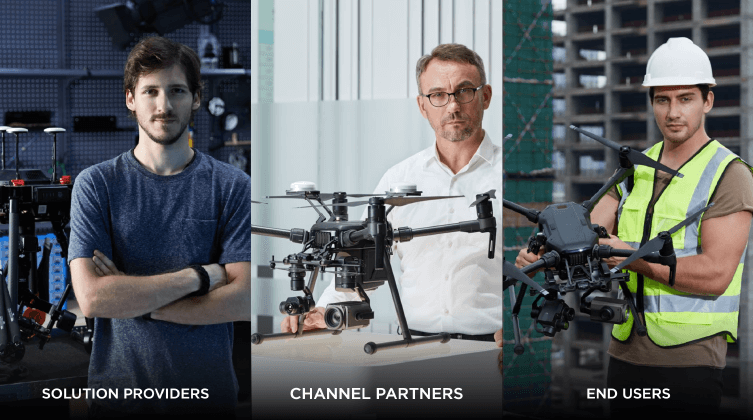Implementing Drone Technology into Transport and Logistics
Drones have long been a desired resource for transport and logistics companies. Drones have promised to minimize health and safety risks, assist in collecting highly-detailed data, add flexibility to inspection operations, and help save a significant amount of time and money.
Over the past few years, these benefits have been realized as more accessible drones have been deployed by leading adopters globally. However, the next step for drones in transport and logistics is to go beyond upgrading workers’ tools with drones by reinventing processes through the use of automated drone solutions.
DFDS, the Danish leader of transport and logistics, took the first step into automated solution just this year in 2019. By collaborating with like-minded partners, they were able to explore opportunities and boost efficiency of inspections of their harbor terminals.
DFDS moves more than 3 million trailers in their own stock and from partners yearly. Locating each one and confirming their position involves tedious manual operations, hence seeking out an alternative method of performing these routine operations became beneficial.

Utilizing a Reliable and Customizable Drone Platform
DFDS sought out new technologies to exploit the new opportunities. At the time, drone use was already considered a common solution for logistics professionals around the world. Determined to create an innovative platform, DFDS consulted UAS Denmark, which resulted in a partnership with Lorenz Technology to pair drones with artificial intelligence. After partnering with Lorenz Technology in 2018 and utilizing AI computing on DJI platforms, DFDS experienced a significant increase in efficiency for their inspection operations.
They chose to operate with the Matrice 210 given its Onboard SDK (OSDK), which provided them access to develop a customized solution. Another important piece of the puzzle is the Zenmuse XT2 which is DJI’s most powerful camera to date for it has both visual and thermal sensors capable of smart AI features that can quickly identify objects, alert pilots of issues difficult to see by human eyes, and simplify the piloting experience.

According to Lorenz Technology, it was incredibly easy to integrate their technology into DJI . They have tried other drones and payloads but the processors weren’t strong enough and it caused some crashes or lags on the transmission.

“At DJI, we invest in building SDKs that enable industry experts, such as Lorenz Technology, to create unique solutions for specific industries and solve real-world business problems,” said Jan Gasparic, Director of Strategic Partnerships at DJI. “There are so many opportunities for SDKs across a wide array of sectors that it is almost impossible for us to unlock their full potential ourselves. These efforts support DJI’s goal of providing comprehensive platforms of the future.”

Conducting Automated Inspections Easily
Lorenz Technology developed a software called Lorenz HiveTM, which allows users to pre-program flight operations and use the Matrice 210 to conduct automated inspections(1). Throughout their operations, DFDS can obtain valuable insight about their trailers, such as their exact locations and their ID numbers. With live video feed, accurate GPS coordinates, and relevant timestamp data, DFDS is also able to make sound decisions on how to utilize the data they receive. After images are sent to the Lorenz HiveTM platform, the data is organized, and then sent to the DFDS terminal management system, giving the drivers the exact location of the trailers for more efficient loading.

The Matrice 210, in combination with AI computing, proved to be more helpful than they initially imagined. The company’s ability to identify and confirm the positioning of their many trailers strengthened greatly. They are able to save 15 minutes (vs. previous manual operations) on loading and discharging trailers from vessels. When loading items onto a trailer, the company can reduce the amount of fuel used by one ton. Time reduced equates to a significant reduction of CO2 emissions and costs. Through optimizing and managing these solutions, DFDS and its partners can always stay ahead of the game.
Limitless Possibilities with Drones and AI solutions

This is just the beginning for DFDS. The next step will be leveraging drones and AI to detect damages on the cargo. This will help the organization save on the total cost of damages and will significantly improve handling and customer service.
DJI’s developer technologies have opened up incredible possibilities, which have allowed companies like DFDS and Lorenz Technology to create specialized solutions. It’s exciting to see what DJI and its industrial partners can achieve together!
(1) DFDS drone operation is classified as “conditional automation,” (based Drone Industry Insights’ 5 levels of drone autonomy) which means that there is still pilot assistance in case something goes wrong during inspections. They have acquired the necessary permits to perform such flights.


.png?width=300&name=HS%20-%20Featured%20Images%20(7).png)
-1.png?width=300&name=HS%20-%20Featured%20Images%20(5)-1.png)
.png?width=300&name=Stormpoint%20(1).png)
